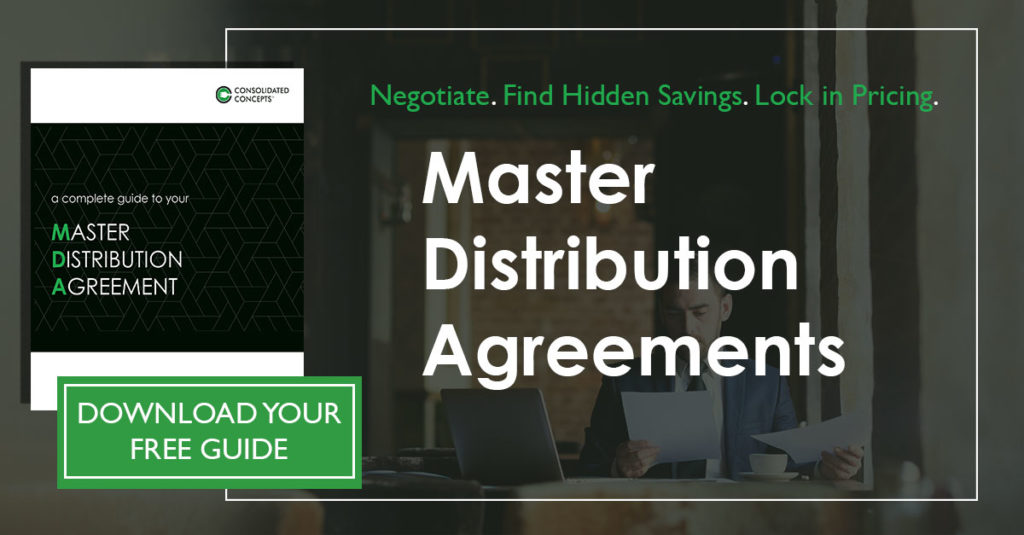The Importance of Restaurants Assessing Master Distribution Agreements (MDAs) in Order to Reduce Costs and Improve Quality
Master Distribution Agreements are the cornerstone for most successful operations in the hospitality industry, at least in terms of optimum pricing and maintaining a solid and reliable supply chain. For restaurants, they provide a strategic and steady cost-saving agreement with their main broadline distributor. Or, at least, that’s what they are designed to do.
Once established, many restaurants maintain the same MDA for years, relying on what has developed into a comfortable relationship with their distributor. Yet this day in, day out, consistent steadiness can, like any relationship that has become somewhat stagnant, end up paralyzing a company’s forward movement and cost operators a percentage of their profits. Experts in procurement, and supply chain analysts, all agree that regular audits and assessments are key to long-term financial health and increased margins.
Here are a few key elements in MDAs that operators should pay attention to:
Contract Timeline
Many MDAs will contain an automatic renewal clause that allows distributors to renew a contract for a year, if they are not notified by the operator within 180 days of the contract termination. Know when your contract ends and take advantage of this opportunity to renegotiate. In addition, contracts that automatically renew often have a clause that allows for cost-of-living increases resulting in increased fees that many operators are unaware of.
When negotiating an MDA, ensure that there is a “no cause exit clause” which allows operators to terminate the agreement with a 60 or 90-day notice.
Auditing
Some contracts will limit the timeframe that a MDA can be audited. It’s important that you maintain the right to audit cost and obtain the actual manufacturer’s paid invoice. Allowances and product discounts should be included in your price. Keep in mind that auditing line-by-line can be extremely time-consuming. A third-party firm, such as Consolidated Concepts, has the software capabilities that make this act effortless, processing and organizing the needed data to accomplish an expert audit readily in real-time.
Drop Incentives
The bigger a load, the better pricing a distributor can normally provide. Make sure that your MDA contains this type of agreement. In essence, it states that as drop sizes increase, your product mark-up decreases. To take advantage of this, consider increasing your size while decreasing your frequency of deliveries with certain types of products.
GPOs
When assessing your MDA, check that it allows you to release data to a third party or Group Purchasing Organization. GPOs give restaurants the combined purchasing power of all of their members and can reduce restaurant costs by up to 30 percent. Dining Alliance is the largest GPO in the industry with a purchasing power of over $10 billion. They also offer a broadline program that includes fixed mark-ups, electronic weekly auditing, and over 350 manufacturer deviations and rebates

Comparing MDAs
According to Barry Friends, a food industry consultant who spent over 20 years as an executive at three of the top five U.S. foodservice distributors, one of the biggest challenges facing restaurants in relation to MDAs is the lack of supply chain personnel as well as the disruption that can occur when sourcing food and operating supplies from just one broadline distributor. As he describes it, “No matter how much you (the operator) know, the distributors know more; they have all the power, and they are excellent at making their customers feel like they have a great deal.” This “great deal” may be far less than what they can actually offer. While costs are driven by the market, there are options that can be included in a MDA that can help reduce price volatility. What is the distributor’s base price, margin, and backend markup and service costs?
Leveraging an organization that works with hundreds of distributors across the nation, including specialized and smaller organizations, allows experts in the field to compare distribution agreements—an ability that makes a tremendous difference when optimizing a MDA.
As is evident, it takes years of experience in the procurement field to be able to address these types of issues with confidence. Consolidated Concepts helps restaurants by leveraging their expertise in supply chain management, operations, distribution, product management, and spend management, ultimately reducing costs while improving quality. As your business grows so too does the ability to negotiate better pricing. Remaining vigilant when it comes to the agreement with your broadline distributor can dramatically affect product costs.
For more information on this important topic, take a look at Consolidated Concept’s, A Complete Guide to Your Master Distribution Agreement.

